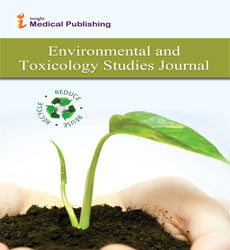Brief Profile of Waste Management in Developing Countries
Lorena De Medina Salas*
Faculty of Chemical Sciences and the Environmental Engineering Educational Program, Universidad Veracruzana campus Xalapa, Mexico
- *Corresponding Author:
- Dr. Lorena De Medina Salas
Professor, Faculty of Chemical Sciences
Universidad Veracruzana
Circuito Gonzalo Aguirre Beltrán s/n, Zona Universitaria
C.P. 91040, Xalapa, Veracruz, Mexico
E-mail: loredms@hotmail.com
Received Date: August 27, 2018; Accepted Date: August 29, 2018; Published Date: August 31, 2018
Citation: Salas LDM (2018) Brief Profile of Waste Management in Developing Countries. Environ Toxicol Stud J Vol.2 No.2: 8.
Copyright: © 2018 Salas LDM. This is an open-access article distributed under the terms of the Creative Commons Attribution License, which permits unrestricted use, distribution, and reproduction in any medium, provided the original author and source are credited.
Editorial
Nowadays, the topic of municipal solid waste (MSW) is a high priority issue in the agenda of every country’s government. Unfortunately, more and more millions of tons of waste are generated each year; this situation has caused serious consequences such as pollution of the air, soil and water levels, as well as effects on the public health of various populations.
In most developing countries, although there is a concern over the excessive generation of waste, there is no a real integrated waste management system, which in theory must include the collection, transfer, storage, treatment and final disposal. In reality, this management is basically limited to two activities, collection and final disposal.
The worst scenario is that a large part of final disposal is carried out in open dumps, with the consequent proliferation of noxious fauna. There are only a few landfills and many of them do not fully meet the requirements for good operation that would minimize environmental impacts. The percentage of treatment given to waste is minimal or practically nil.
Some Latin American countries are making great efforts to improve this situation, through investment in research and development of new technologies that allow an increase in the percentage of waste treated. Much of the research in this area is carried out in re-manufacturing processes through recovered materials, metal recovery, among others. Likewise, recycling is being used as a supportive alternative to reduce the volume of waste.
On the other hand, education is undoubtedly the fundamental pillar that can make a difference. In many cases, society’s awareness has been a great ally of waste management. Promoting the importance of environmental preservation in the new generations has led to great results, even in small rural communities; such is the case of whole families that participate in the separation of the MSW from the source, and this activity is part of an "environmental culture".
Another important aspect is participation in municipal governments, since through fiscal incentives, citizen participation can be encouraged in MSW separation programs from the source, as well as in other recycling or composting activities.
The establishment of composting or anaerobic digestion plants can become an accessible reality for the municipalities, which generally have limited economic resources; however, if medium-term coordination is achieved between several municipalities, these plants can be established and in addition to the environmental benefits inherent to them, this will also generate new direct jobs.
In this sense, it is necessary to inform municipal governments that there are programs to promote waste management through various economic support funds, such as those granted by the United Nations (UN), which allow access to financial resources for the establishment of this kind of infrastructure.
In order to obtain these resources, it is necessary for the municipal governments to carry out an adequate strategic plan that comes from an initial diagnosis of each of the stages of their waste management system, detailing objectives, goals, strategies and actions in each case, so each phase can be followed up.
The new waste management system that is proposed must have permanent monitoring and continuous improvement mechanisms that ensure that regardless of the transition between governments, the activities related to MSW will continue to be carried out permanently.
The recovery of waste is an area of opportunity to influence public policies through the incorporation of valorization techniques such as gasification and plasma among others. Implementing valorization as a priority can contribute significantly to reducing the environmental lag in developing countries.
The search for circular economies in rural, urban or metropolitan communities could facilitate the integral vision required to achieve waste management. Thus, it is important to reinforce municipal environmental public policies, since legislation must begin to incorporate the reuse of materials. This can be achieved through the development of strategies that favor efficiency in each of the stages of waste management.
Sustainability must be the priority that allows taking a concrete line of action defined by all governments. Understanding that a great part of the waste generated can be reused and put back into the market is a fundamental step to achieve progress in this direction.
Open Access Journals
- Aquaculture & Veterinary Science
- Chemistry & Chemical Sciences
- Clinical Sciences
- Engineering
- General Science
- Genetics & Molecular Biology
- Health Care & Nursing
- Immunology & Microbiology
- Materials Science
- Mathematics & Physics
- Medical Sciences
- Neurology & Psychiatry
- Oncology & Cancer Science
- Pharmaceutical Sciences
